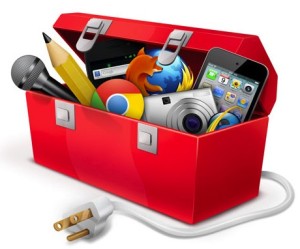Writing: Writer’s Tools, a Topic of A-muse-ment
Tools—what does a writer need with tools or artifices of any kind? After all, the only things a good storyteller needs are his or her imagination, a voice, and a willing audience. This is the raw reality that all author hopefuls should face and reflect on. If someone suddenly stopped you in a hallway—and you had to make up a story right then—could you do it? Some of us, as hall-pass abusers and class ditchers, may have had to face that trial on an occasion or two.
Telling a story to a group of people, especially colleagues and friends, is something most of us do every day, and is a pastime that many enjoy. Few writers lack the ability to spin a verbal yarn. After all, speaking comes much more naturally and easily than does committing words to a page. The main difference is that the audience of a verbal storyteller is less likely to be as critical as those of written piece. Also, the typical story told in the flesh isn’t quite as complicated or as deep as a literary work.
Novels, and even stories, can get complex in a hurry—especially if the writer has a particular agenda to pursue. Of course, it isn’t the complexity that usually causes us as writer’s to lag, slow down and potentially stop. It often isn’t the story at all, but everything else.
Most of the feat of completing a book is psychology. When you know there’s a fat paycheck waiting at the end of your toil, it’s much easier to keep at it. However, to finish a book when there’s a chance no-one will even read it—much less pay you for it—ah yes, that’s an endeavor of a whole different color. We each have our ways of justifying our efforts. The simplest of these is that we simply enjoy writing. Others may say it’s the satisfaction of creating something. For myself, it’s pursuing the elusive muse to see how the story turns out—because I may know where the path leads, but I rarely know exactly what I will find at its end. That discovery is enough reward to keep me chugging along.
To put it simply, writing is not easy. It’s long trek up hill. Many of us are already conditioned and the trekking itself isn’t that tiring. It’s those days when we have other things to contend with besides the writing itself that it gets really tough. You know, those days when reality starts getting in the way. The list of bumps that can manifest themselves in our paths is long and sordid, we all know what they are and no treatise is either long enough, or oracle enough, to really do the topic justice. Suffice to say, living with our jobs, families, and the host of disasters, natural and not, is pretty tough in- and-of-itself.
That roundabout path leads us the topic of simply getting writing done, and making what writing you do easier. If you’re being faithful to your art, and you’ve fought off the droves of life’s distractions and clawed your way to your favorite writing chair, the last thing you want, is to spend 15 minutes of your valuable time simply trying to think of a word. That’s why the thesaurus, both the held and electronic kind were invented. That synonym is simply one tool, among many that can make your writing life easier. Now, that isn’t to say just having a thesaurus will keep you from that 30 minute word search… If you’re a perfectionist or simply must remember that word that fits precisely what you mean… but you just can’t…quite…recall. It’s really annoying isn’t it? Get used to it, the rest of your writing career will be visited by these little ‘episodes’ from time to time. It sometimes makes you think you’ve lost your faculties (and worse).
The Writer’s Toolbox
There’s some unusual items in this list, but bare with me, they make sense in the long run. One of your first best tools you already have—a computer—or I assume you have one, because the text you’re reading started it’s life on the internet, and it’s tough to surf the web without a computer. Here, I know plenty of people will chime in with a plethora computer alternatives—set-top boxes, internet appliances, game consoles… okay, okay… we’re talking about writing… not technology.
In all earnestness, if you’re not using a computer to write you are missing out. I don’t care about the curmudgeons like Ellison who say they’ll die before ‘using one of those damn things’. Guess what, the words go into a computer eventually. Modern book-binding presses are run by computer and it all comes down to the data being fed in off a network. With the advent of Print On Demand (POD), sometimes a human doesn’t even see the document until the book arrives in your mail!
Someone has to type it in. The stark reality is that the best person to do the typing is YOU! No-one cares as much about what you’ve written as you. If, god-forbid, you handwrite it and have someone else type it up, mistakes will be introduced—guaranteed. If you hand-write, then type it yourself, you’re wasting valuable energy. I know I’ve written this before, but it bares repeating. Composing at the keyboard is a discipline. Learn it! It may take practice, but it is worth it—really! Modern word processors have spell and grammar check abilities, that while still a bit inaccurate, are still helpful. The energy you expend painstakingly transcribing from notepad to word processor could be used instead to polish the prose.
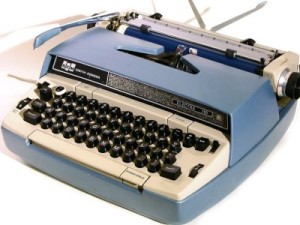
I have a long history with word processing. From 1978 to 1983, my first two and half books were hammered out on a Smith Corona electric typewriter, white-out and all. I still have have the scripts for sentimental value. In 1983, I purchased a Kaypro II suitcase computer with a 9 inch green screen. It ran MicroPro’s Wordstar application. I wrote 3 books, and switched to PC in 1986.
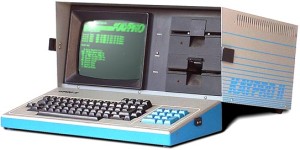 I stayed with Wordstar’s incarnations up to version 7 well into the 90’s. It was simple—it never crashed, never ate my documents, and didn’t make weird printing mistakes. A couple years after Wordstar came out, people started using Word Perfect.
I stayed with Wordstar’s incarnations up to version 7 well into the 90’s. It was simple—it never crashed, never ate my documents, and didn’t make weird printing mistakes. A couple years after Wordstar came out, people started using Word Perfect.
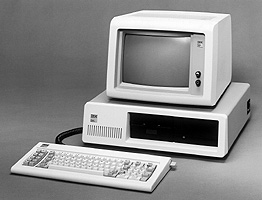
I hated it—passionately. To the point, that if it were the only software available, I would never have written. That’s how much the early incarnations of that program annoyed me.
I spend these words on word processors because they are a matter of personal preference. If you haven’t tried alternates to whatever you are using, spending some time with other software could be hugely beneficial. You won’t know if there’s a better way to do something until you try.

Finding a favorite word processor is kind of like locating the holy grail. When things work the way you want, the software becomes and asset rather than a hindrance. If you don’t already know, there are quite a number of capable alternatives to the big incumbent (Microsoft Word). In fact, several are free: Google Docs, LibreOffice, Kingsoft Office Suite Free, Open Office, and Office Web App. Once you’re sure you have what works best for you. Stick with it and learn all its tricks. Don’t forget industry standards. Some people use windows built-in notepad or Wordpad (because they are simple and free). These won’t cut it when you need to submit or share your work. Almost all publishers want the document either in docx (MS Word), RTF (Rich Text Format), or PDF (Adobe Portable Document Format). Print On Demand publishing wants a press-quality PDF. All of the softwares mentioned above will do one or more of these three. If you settle on one not on that list make sure it can export the documents for publishing and submission purposes.
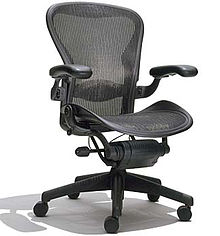 The computer is a pretty obvious tool. Did you ever think of the chair you sit in, or the cradle you put copy in as tools? They are. The pens you use to proof copy are tools too.
The computer is a pretty obvious tool. Did you ever think of the chair you sit in, or the cradle you put copy in as tools? They are. The pens you use to proof copy are tools too.
On the chair, treat yourself right, get a good chair that supports your back so you can sit and focus on what you’re doing for more than 30 minutes at a time. I splurged for an Aeron years ago, I have not regretted it.
Ergonomists advise workers to get up and stretch about twice and hour to keep muscles loose and relaxed. Do it… it’s the right thing to do. Do you need glasses to read copy or the screen? Wear them, damn it, and keep the prescription current. You don’t need eye strain.
 If you’re serious about writing and you’re using a computer, get the best possible screen you can reasonably afford. I recommend a true HD (1920×1080) or higher display. A twenty-seven inch screen is gang-busters for content creation.
If you’re serious about writing and you’re using a computer, get the best possible screen you can reasonably afford. I recommend a true HD (1920×1080) or higher display. A twenty-seven inch screen is gang-busters for content creation.
For a writer, screen real-estate is essential for ease of reading and for windows where you are doing research or looking up things relevant to your writing. 
So, if you can possibly afford the monitors and the necessary video card to drive it, a dual monitor configuration is productivity heaven. Having such a setup you get spoiled very fast.
Enough about electronic tools. Lets talk basic tools—a dictionary and thesaurus. Whether electronic or paper or both, it’s something you should have. A nice substitute for actual dictionary or thesaurus software are the websites https://www.dictionary.com and https://www.thesaurus.com which I use when I have access to the internet and I’m not on my home machine. There are a whole host of writers help sites (like the one you’re reading this on) they can be considered tools to. Read widely and learn…
If you’re marketing your work, I suggest having current copies of either the Writer’s Market, Novel and Short Story Writer’s Market, or the Writer’s Guide to Book Editors, Publishers, and Literary Agents.
Okay, back to electronic gadgets. Another tool that is important to marketing writers is a printer. 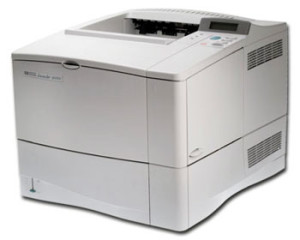 A laser is best. It’s fast and the text is clean and durable. I don’t think anybody accepts dot matrix anymore. (Do they even exist?) Inkjet printers render fine copy BUT the cost per image is more expensive than you realize. One cartridge which runs around $30 USD will print around 500 pages. In a low-end laser, a $65 cartridge lasts about 5000 pages. That’s 80% less per page, if the math eluded you. The laser printer will cost you twice as much as the inkjet. However, if you print 5,000 pages, the laser has paid for itself in what is saved in cartridges. People will scoff here… 5,000 pages… yeah, right. A book is on average 400 manuscript pages. If you go through 3 drafts, and send out only 5 copies. That’s 3200 images. Which is $210 worth of inkjet cartridges. The inkjet, if it’s fast will print 6 – 8 pages a minute. The HP 4100 (pictured above) prints 25 pages a minute and holds an entire 500 page ream of paper (instead of 150 pages (or less)). Guess which of us baby-sits the printer when a novel needs to be hard copied? My whole book prints in less than an hour. It’s worth every darn penny because my time is precious. The cartridges are refillable on this higher end printer too. Refills cost $35 and go 10,000 images. Yes, I love my printer.
A laser is best. It’s fast and the text is clean and durable. I don’t think anybody accepts dot matrix anymore. (Do they even exist?) Inkjet printers render fine copy BUT the cost per image is more expensive than you realize. One cartridge which runs around $30 USD will print around 500 pages. In a low-end laser, a $65 cartridge lasts about 5000 pages. That’s 80% less per page, if the math eluded you. The laser printer will cost you twice as much as the inkjet. However, if you print 5,000 pages, the laser has paid for itself in what is saved in cartridges. People will scoff here… 5,000 pages… yeah, right. A book is on average 400 manuscript pages. If you go through 3 drafts, and send out only 5 copies. That’s 3200 images. Which is $210 worth of inkjet cartridges. The inkjet, if it’s fast will print 6 – 8 pages a minute. The HP 4100 (pictured above) prints 25 pages a minute and holds an entire 500 page ream of paper (instead of 150 pages (or less)). Guess which of us baby-sits the printer when a novel needs to be hard copied? My whole book prints in less than an hour. It’s worth every darn penny because my time is precious. The cartridges are refillable on this higher end printer too. Refills cost $35 and go 10,000 images. Yes, I love my printer.
For those of you going to a copy service to duplicate your 400 page book at $0.03 an image… that’s $12. The laser printer is doing it for roughly one SIXTH the cost ($2). It’s all a matter of math and perspective.
Your personal library is a tool. I hope you have favorite books that you keep and can reread. Try to read not only in the genre that you write but in other disciplines as well. The cross pollination will serve you well when you need to go to the well for inspiration on characters, dialogue, and scenes. That library will also be a safe retreat when you simply can’t write and need to relax.
The last tool I want to mention here is the least obvious—your brain. In many ways, it’s like a machine, and proper care and feeding will keep it operating at peak efficiency. I’ve said before to write whenever you can. Here I would like to add that as you get more serious about writing, learn the times when writing is easiest. Some people are night owls, others early birds, for others it’s after lunch or before dinner. Learn when you most easily get in the groove and try to make that your scheduled time to write. Don’t write anything vital if angry or depressed unless you feel adequately able to channel that energy appropriately. Don’t force yourself to write if you’re tired unless you find the activity relaxing. Make writing enjoyable for yourself, and reward yourself when you reach milestones. Find ways to motivate you to keep going. Writers tend to be solitary, so you have to be your own coach.
Coaching is the last topic I’ll touch on. One of the BEST tools a writer can have is a good critique group, whether online or in the flesh. However, the topic merits its own section. In fact, there will be 3 entire installments (sections 7 to 9) that deal with advice materials, seminars and conferences, and read-and-critique groups.
In the next section we’ll deal with completion—getting the book done. In that section we’ll revisit tools and ways they can help us chug along to the end of a novel or short story.
